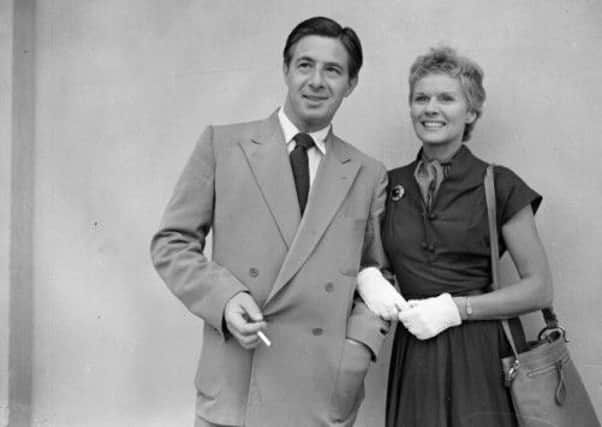Obituary: Paul Rogers, actor


WITH his swarthy good looks and mane of distinguished hair, Paul Rogers cut an imposing figure on stage. His career began in the 1950s with the Old Vic Company, with whom he made many visits to the Edinburgh Festival. Rogers was a fine interpreter of the classics – he was, for example, a thrilling and dangerous Macbeth in a gripping production at the Assembly Hall in 1954.
Later, with the Royal Shakespeare Company, he became recognised for his skilful interpretations of contemporary playwrights such as TS Eliot and Harold Pinter. In the latter’s The Homecoming, Rogers created the role of Max, the grumpy patriarchal widower, who snarled and bullied his family with a cunning ferocity. When he played the role on Broadway in 1967, he won a Tony award for Best Actor in a Drama.
Advertisement
Hide AdAdvertisement
Hide AdOn television, Rogers was often cast as authoritative figures in such series as the Dean in Porterhouse Blues, Kavanagh QC and Lovejoy. In 1991, Rogers scored a considerable success as Sir Geoffrey Howe in Granada’s Thatcher: The Final Days.
In all, Rogers made six visits to the Festival. His first was in 1950 in a strongly cast (Dorothy Tutin, Leo McKern) Old Vic production of Ben Jonson’s Bartholomew Fayre.
In 1953, he was in the world premiere of TS Eliot’s The Confidential Clerk, which proved a major Festival hit and transferred to both London and New York.
Rogers won praise for bringing to the social comedy a light agility, which mirrored the expectations of Eliot at a press conference before the first night at the Lyceum Theatre. “If one wants to say something serious nowadays,” the author suggested, “it is easier to say it in comedy.” Rogers balanced Eliot’s dry humour with a deft sense of theatre.
The following year, Rogers was Macbeth with Ann Todd as his queen and in 1955 he returned with the Old Vic as Brutus in Julius Caesar, alongside John Neville.
Rogers returned to Edinburgh in 1958 in another TS Eliot world premiere, The Elder Statesman, in which he starred with Anna Massey. In 1986 he was in the midnight gala concert, introduced by Sir Sean Connery, in the Usher Hall celebrating 40 years of the Festival.
Paul Rogers was the son of a school teacher and educated at Hooe School in Devon and studied drama at Dartington Hall, where he was much influenced by the Russian method of acting. After a few professional appearances in repertory theatres, he joined the Royal Navy on the outbreak of the Second World War.
In the post-war years, Rogers joined the Bristol Old Vic for Tess of the d’Urbervilles, which transferred to the West End in 1947. London’s Old Vic had suffered bomb damage during the war and when it reopened in 1951 Rogers was a principal with the company for more than a decade, performing many leading Shakespearean roles such as Malvolio, a fierce Macbeth and a delightful Touchstone.
Advertisement
Hide AdAdvertisement
Hide AdThroughout his career, Rogers was seldom out of work and he gained a considerable renown on Broadway after appearing there in The Confidential Clerk. Rogers starred in Anthony Shaffer’s hit play Sleuth, when it transferred to Broadway and as “Sir”, the wildly theatrical character (based on the actor Donald Wolfit), opposite Tom Courtney in Ronald Harwood’s The Dresser in 1981.
In 1982, Rogers and Massey were in a historic National Theatre production of Oscar Wilde’s The Importance of Being Earnest. While Judi Dench was a commanding Lady Bracknell, Rogers and Massey were in fine form as Canon Chasuble and Miss Prism – the role of the fussy vicar Rogers played with obvious glee and he won the Critics Circle Award as a supporting actor.
The director, Peter Hall, decided to perform the Wilde in tandem with three plays by Pinter. A Kind of Alaska, was a sad short play about sleeping sickness. In one emotional scene with Dench, one critic wrote: “Rogers brings an amazed, compassionate stillness as one of the unrecognised relations.”
Most of Rogers’ career was concentrated on the stage, but he enlivened several movies with some delightful cameo performances. These included William Pitt in Beau Brummel, Frank Harris in The Trials of Oscar Wilde and as an officer in Billy Budd.
Many will recall the savagery and ferocity of Rogers’ performance of the foul-mouthed irascible father figure in The Homecoming – both on film and stage. Vocally violent, Rogers was able to subtly convey the beauty of the text with adroit agility. Rogers communicated his character’s deep dislike of his sons, thus diverting attention away from his own puny life.
Rogers, who was a talented painter in watercolours, was twice married. His first marriage to Jocelyn Wynne was dissolved and his second wife, Rosalind Boxall, died in 2004. He is survived by two sons of his first marriage and two daughters of his second.